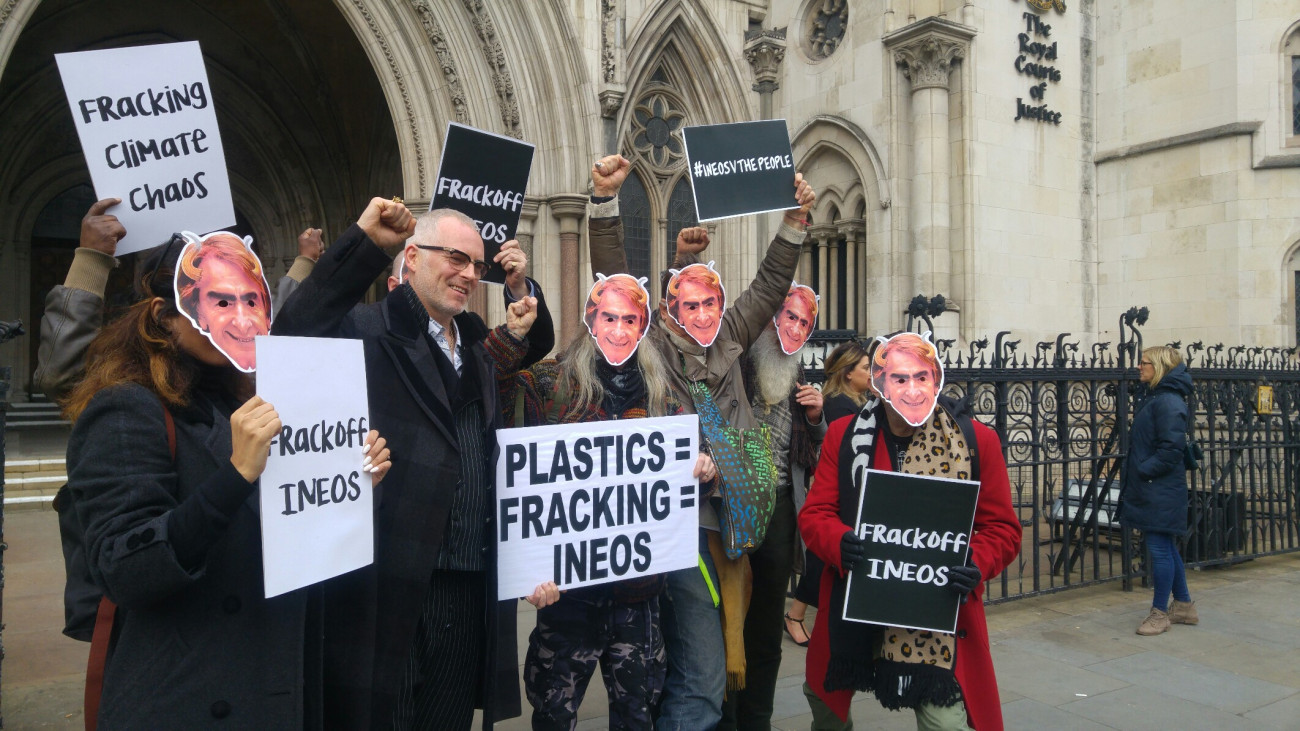By Ruth Hayhurst for Drill or Drop
The injunction against anti-fracking protests granted to Ineos is already breaching rights to freedom of speech, the court of appeal heard today.
A challenge, brought by fashion designer Joe Corre and campaigner Joe Boyd, argued that the injunction against actions at Ineos sites and premises was “wide-ranging, unclear, unfair and based on exaggeration and untested evidence”.
Heather Williams QC, barrister for Mr Boyd, said:
“It is having an impermissible and severe chilling effect on the right to free speech and to protest. It is an unlawful interference with those rights.”
The High Court judge, Mr Justice Morgan, first granted the injunction to Ineos at a private hearing in July 2017.
It became a template for later injunctions granted to Cuadrilla, UK Oil & Gas, IGas and Angus Energy.
People who breach the terms of the injunction could be in contempt of court and face up to two years in prison, unlimited fines or seizure of their assets.
Mr Boyd and Mr Corre are appealing against the injunction on three grounds: It should not have been made against ‘persons unknown’; It should not outlaw protests against Ineos’s supply chain; Mr Justice Morgan failed to assess Ineos’s evidence, as required by the Human Rights Act.
Today’s hearing, at the Royal Courts of Justice, was before three law lords and was being seen as a test case for protest injunctions. Three QCs represented the campaigners and Ineos, with support from another four barristers. Friends of the Earth has also intervened in the case. The arguments are due to conclude at lunchtime tomorrow (6 March 2019).
‘Almost Alice in Wonderland’
Both challengers sought to overturn the injunction because Ineos took action against “persons unknown”.
This meant there were no parties or named defendants in the case.
People would become a defendant only if they breached the injunction by trespass, obstruction of a site entrance or section of the highway or by interfering with Ineos contractors.
Stephanie Harrison QC, for Mr Corre, said the descriptions of these actions in the injunction order were “unclear, subjective and too wide-ranging”.
She said people could breach the injunction by stepping off a footpath after a runaway dog, or if their car broke down or if a lorry shed a load.
“This a wholly novel situation. There are no “persons unknown” before the court.
“The only point when you know you are defendant is when you face committal [for breach of the injunction].
“It is sentence first and verdict second.
“It is not quite Alice in wonderland but it is not far off.”
Ms Harrison said:
“Ineos identified a large number of individuals in evidence, making allegations of criminal and tortious conduct. Those persons were not before the court and did not have any opportunity to defend themselves.”
She said local people living near Ineos sites also had no voice in the injunction proceedings:
“Becoming a named defendant risks costs, damages and future liability.
“The threat of severe penalties for breach and prohibitive costs liability was a serious deterrent to those local people from coming forward to participate.”
Ms Harrision added:
“What happened here is a fundamental departure from due process.
“It is plainly not open to the court to pursue that sort of process. There is no statutory provision for it or, at best, the rules are ambiguous. It is not in accordance with the common law.”
Supply chain injunction
The order granted by Mr Justice Morgan prohibited conspiracy to use unlawful means against contractors and the supply chain.
Heather Williams told the court that people could breach the injunction if two or more combined together to take unlawful action against the supply chain with the joint intention of causing damage to Ineos.
The order specifically outlawed long-standing protest techniques, such as slow walking, which has been tolerated by some police forces and courts, as well as lorry surfing and lock-ons.
Ms Williams said:
“We are in a situation under this injunction where two people could talk about obstructing the highway and plan to do it. They would have potentially breached the injunction and face serious penalties. If they went out and did the obstruction the most that could happen to them under the criminal law would be a £1,000 fine.”
Ms Williams said Mr Justice Morgan had been wrong to create what she described as:
“a novel, uncertain, unnecessary and disproportionate injunction which exposes a significant number of people to serious penalties for freedom of speech and protest-related activities and is already having a serous chilling effect.”
She said the judge had failed to consider whether this part of the injunction was necessary or proportionate. He also failed to take into account tolerance of protest activity required of the authorities.
Mr Justice Morgan was wrong, Ms Williams said, to apply a blanket ban on slow walking, lock-ons or lying on the road. He was also wrong to specify what was a reasonable use of the highway without referring to the Human Rights Act, she said.
Ms Williams said there were already powers available under the criminal law and other forms of injunction, including public nuisance.
She added that Ineos had failed to provide any evidence of financial loss to its companies because of actions against its supply chain. It was open, she said, to Ineos contractors to take out their own injunctions.
‘Exaggerated and selective evidence’
Ineos had argued that the injunction was needed because there was an imminent threat against its sites and contractors.
Both Mr Boyd and Mr Corre argued that Ineos had provided what they described as “selective, exaggerated and inadequate evidence” to back up this case.
Ms Williams told the court:
“Most protest against fracking was and is entirely lawful but Ineos evidence elided lawful protest activity with the imminent risk of unlawful behaviour.”
She said the evidence, mostly based on protests at other operators’ sites, did “not come close” to supporting Ineos’s fears.
Ms Williams added:
“There appear to be no prior examples of injunctions of this kind having been granted in favour of particular companies on the basis that the nature of the industry in which they are involved is controversial and attracts protest
She said
“Mr Justice Morgan erred in failing to conduct any or any proper analysis of the evidence relied upon to determine whether a trial would be likely to accept the asserted risks”.
She said he failed to distinguish between lawful freedom of expression and assembly, protected under the Human Rights Act, and unlawful activities. He also failed to acknowledge that the evidence had been disputed at the original injunction challenge.
‘No error of legal principle’
Alan Maclean QC, for Ineos, defended Mr Justice Morgan’s ruling on the injunction. He said:
“The judgment contains no error of legal principle.
“The learned Judge, in a characteristically full and rigorous judgment, directed himself by reference to well settled principles of law, and applied those principles to the facts of the application in order to decide whether to exercise his discretion to grant interim relief, and if so, on what terms.
Mr Justice Morgan’s approach to the law was orthodox and correct, and his application of that law to the facts and the exercise of his discretion to grant relief is, it is submitted, unimpeachable on appeal.”
Mr Maclean said Ineos sought to prevent protest camps becoming established before work was carried out at the prospective sites.
On “persons unknown”, he said a recent ruling by the Supreme Court on had no impact on the case.
He said:
“Mr Justice Morgan accepted that persons unknown was an established and permissible way to proceed, no special justification needs to be shown”
He told the court:
“The protesters are the people who Mr Justice Morgan said there was no reason to say they would not take action against Ineos in future.
“They are real people. They are not imaginary people. They are real protesters but they are not able to be identified.”
Mr Maclean added::
“It is impossible in the context of an evolving and amorphous group of people without any structure to pin down the particular human being you need to go after to maintain the integrity of a piece of land and access, without which all commerce is impossible.”
He told the court that as a result of the injunction:
“There is no violence done to the rules. No injustice has been done to any individual.”
Mr Maclean will continue making his case for the injunction tomorrow morning. The hearing in court 67 at the Royal Courts of Justice on the Strand, London, begins at 10.15am.
Image credit: DrillOrDrop
Subscribe to our newsletter
Stay up to date with DeSmog news and alerts







